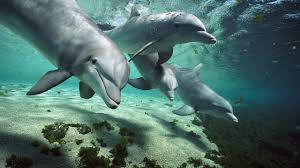At this point in the Earth’s evolutionary history, the world has produced what could be called two exceptional intelligences – human and dolphin. Many species in the animal kingdom have shown themselves to be surprisingly able in this regard, but dolphins are clearly a special case. If there is any single animal we share our world with whose brain physiology, cognitive ability, and social and other intelligence may rival ours, dolphins are it.
It wasn’t until fairly recently that we’ve become aware of this, despite the fact that we and our forebears have coexisted for what amounts to millions of years. Now, our technological capabilities allow us to make frequent incursions into the dolphin’s realm, thus bringing us into contact. We have a ways to go to properly understand them – but we do know a lot at this point. We both have highly developed social structures and interpersonal bonds. We both possess a sense of self, and an awareness of being unique individuals. And we, both humans and dolphins, have a well-developed knowledge of what constitutes proper behaviour towards other members of the group.
We could argue over who has superior cognitive abilities, but that’s probably beside the point. They appear to be superior to us in some regards, and we to them in others. But having developed in very different environments, with completely different requirements for survival, our respective intelligences evolved along unique and distinct paths. Not directly comparable, at least not at our present level of understanding.
When it comes to distinctions between the two types of intelligence, there can be little doubt that the key one, probably little more than an accident of having evolved with those different requirements, is that we are tool makers and they, except to a very limited extent, are not. Our ability to make tools and to manipulate features of our environment far surpasses theirs, and this gives us every advantage over them. So I would argue that this places on us a fiduciary duty to:
- Not place things into their environment which can harm them and which they continuously need to avoid
- Not remove things from their environment which they need to survive
- Not enslave them for our use, whether for entertainment, research or any other purpose, and
- Not to to kill them….
… all things we frequently elect to do, simply because we can, and because most of our fellow humans elect not to stop us.
So that’s to briefly touch on the moral argument. But if that isn’t good enough for you, what about the practical argument?
The fact is that dolphins occupy a similar position as ourselves, at the apex of a wide, complex biosphere, but dependent on the health of everything below. Like us, they cannot prosper otherwise. Everything that cetaceans need, we ourselves need. Thriving cetacean populations will point to our success in maintaining the health of the seas we ourselves are so heavily dependent on.
Everything we need to do to maximize their interests, we happen to need to do for our own. If we perceive ourselves to be in conflict with them, if we feel the situation calls for having to choose between us or them, we can be certain that somewhere along the way we’ve made a fundamental error. Our interests do not diverge from theirs.
Perhaps what it all boils down to is this, as expressed on our CCA website: “Humankind faces an urgent moral question, intricately wrapped up in the environmental crisis which is our failing stewardship of the Earth’s oceans. We need to be able to see the world from the perspective of creatures so physiologically different from ourselves, yet in other ways so alike. Our learning to empathize will, in the end, be critical to our own chances for success, and even to the prospect of our own survival.”
For The Orca’s Voice,
Chris, and the CCA Team



Leave a Reply